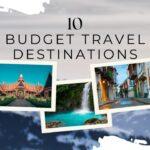Budget traveling can be a rewarding experience, but it requires careful planning and research to get the most out of your money. From flights to accommodation and activities, every penny counts when you’re on a tight budget. In this post, we’ll reveal some insider secrets for budget traveling, including the dos and don’ts that can save you money and make your trip more enjoyable. Let’s get started!
The Dos of Budget Traveling
Do Your Research
One of the most important things you can do when planning a budget trip is research. By doing your homework, you can save money on flights, accommodation, and activities, and make the most of your time in a new place. Here are some tips for researching your trip:
Look for Flights on Discount Sites
Before booking your flights, be sure to compare prices on discount sites like Expedia, Kayak, and CheapOair. You can often find great deals on flights, especially if you’re flexible with your travel dates and times.
Find Affordable Accommodation
To save money on accommodation, consider booking a hostel or guesthouse instead of a hotel. Websites like Hostelworld and Booking.com offer a wide range of budget-friendly options in popular destinations. You can also consider renting an apartment through Airbnb or Vrbo, which can be more affordable than a hotel room.
Research Free Activities
To make the most of your time in a new place without breaking the bank, research free activities like museums, parks, and walking tours. Many cities also offer free or discounted admission to attractions on certain days of the week.
Travel in the Off-Season
Traveling in the off-season can save you money on flights, accommodation, and activities, and also give you a chance to experience a new place in a different way. Here are some tips for traveling in the off-season:
Choose the Right Time to Travel
The off-season varies by destination, so be sure to research the best times to travel based on your destination and type of travel. For example, traveling to Europe in the winter can be more affordable, while traveling to the Caribbean in the summer can be less expensive.
Avoid Peak Travel Times
To save money on flights, avoid traveling during peak travel times like holidays and weekends. Flights are often more expensive during these times, so consider traveling mid-week instead.
Pack Light
Packing light is a great way to save money on luggage fees, and it can also make travel easier and less stressful. Here are some tips for packing light:
Use a Packing List
Before packing, create a packing list to ensure you only bring what you need. You can also use a packing app like PackPoint to create a customized packing list based on your destination and type of travel.
Bring Versatile Clothing
To save space in your luggage, bring versatile clothing that can be mixed and matched. Pack clothing that can be dressed up or down, and choose items that can be worn in multiple outfits.
Consider packing items that can serve multiple purposes, such as a scarf that can double as a blanket or a swimsuit that can be worn as a top. Remember that you can always buy items that you forgot or need while traveling, so don’t worry about packing every possible item.
Eat Like a Local
Eating like a local is a great way to save money on food and also experience a new culture. Here are some tips for eating like a local:
Try Local Street Food
Street food is often affordable and delicious, and it’s a great way to try local cuisine. Be sure to research the best street food in your destination, and try as many dishes as you can. To find the best local food options, ask locals for recommendations or use food apps like Yelp or TripAdvisor. You can also look for local food tours or cooking classes to get an even more immersive experience.
Visit Local Markets
Local markets are great places to find affordable and fresh food, and they also offer a chance to interact with locals and learn more about the culture. Be sure to check out the local markets in your destination and try some of the fresh produce and local delicacies.
The Don’ts of Budget Traveling
Don’t Exchange Money at the Airport
One of the biggest mistakes that budget travelers make is exchanging money at the airport. Airport exchange bureaus often offer unfavorable exchange rates and high fees, which can significantly eat into your travel budget.
Instead, research the best exchange rates and fees ahead of time and exchange money at a bank or reputable exchange bureau in your destination. Here are some tips for exchanging money:
Use ATMs
Using ATMs is often the most affordable way to exchange money, as they offer a fair exchange rate and low transaction fees. Be sure to check with your bank before you travel to ensure you can use your ATM card abroad.
Exchange Money at Local Banks or Exchange Bureaus
If you need to exchange money, consider using a local bank or exchange bureau instead of the airport. They often offer more competitive exchange rates and lower fees.
Using Creditcard: You can also consider using a credit card that doesn’t charge foreign transaction fees or has favorable exchange rates.
Don’t Overspend on Souvenirs
While souvenirs can be a great way to remember your travels, they can also be expensive and add up quickly. Instead of buying souvenirs at tourist shops, look for local markets or street vendors where you can find unique and affordable souvenirs.
You can also consider buying practical items that you need while traveling, such as clothing or travel gear, as souvenirs. These items can serve as a useful reminder of your travels and won’t take up space in your luggage.
Don’t Ignore Local Customs
When traveling on a budget, it can be tempting to cut corners and ignore local customs. However, this can lead to uncomfortable situations and even offend locals.
Before traveling to a new destination, research the local customs and etiquette. This can include how to dress, how to greet locals, and how to behave in public places. By following local customs, you can show respect and gain a deeper understanding of the local culture.
Don’t Overpay for Tourist Traps
Tourist traps are common in popular destinations, and they often charge inflated prices for food, souvenirs, and activities. Here are some tips for avoiding tourist traps:
Research Prices
Before you travel, research the average prices for food, souvenirs, and activities in your destination. This will give you a better idea of what you should be paying, and help you avoid overpaying for tourist traps.
Ask Locals
Locals often know the best places to eat, shop, and visit, and they can also give you insider tips on how to save money. Don’t be afraid to ask for recommendations, and be open to trying new things.
Conclusion
By following these dos and don’ts of budget traveling, you can save money and have a more enjoyable trip. Remember to research your trip, travel in the off-season, pack light, eat like a local, and avoid tourist traps. With careful planning and a sense of adventure, you can experience the world without breaking the bank. Happy travels!




